| Listing 1 - 10 of 17 | << page >> |
Sort by
|
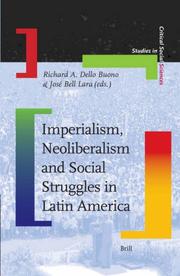
ISBN: 9789004153653 9004153659 9786611400507 1281400505 9047410882 9789047410881 9789047410881 9781281400505 6611400508 Year: 2007 Volume: v. 7 Publisher: Leiden Boston Brill
Abstract | Keywords | Export | Availability | Bookmark
 Loading...
Loading...Choose an application
- Reference Manager
- EndNote
- RefWorks (Direct export to RefWorks)
This collection of works by prominent Latin Americanists explores the social and political dynamics of this important region in transition to a post-neoliberal era. The first part deals with the intensifying regional crisis created by neoliberal policies, showing how regime stability has been broadly undermined, with specific attention given to the cases of Panama and Argentina. In the second part, a sympathetic yet critical evaluation is offered on the diverse development strategies that have been pursued by four leftist governments in power, namely, Cuba, Brazil, Venezuela and Uruguay. In the final section, various aspects of the constraints facing the region are discussed and consideration is extended to some of the emerging social movements that seek to radically transform Latin America.
Neoliberalism --- Néo-libéralisme --- Latin America --- Amérique latine --- Economic policy. --- Social policy. --- Politics and government --- Politique économique --- Politique sociale --- Politique et gouvernement --- Néo-libéralisme --- Amérique latine --- Politique économique --- Imperialisme. --- Neokolonialisme. --- Sociale bewegingen. --- Latijns-Amerika.
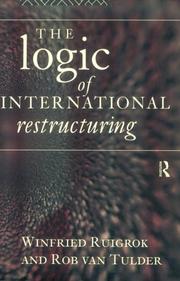
ISBN: 0415122392 0415122384 9780415122399 Year: 1995 Publisher: London Routledge
Abstract | Keywords | Export | Availability | Bookmark
 Loading...
Loading...Choose an application
- Reference Manager
- EndNote
- RefWorks (Direct export to RefWorks)
813 Methodologie --- 824 Globalisering --- 831.1 Handelspolitiek --- 836 (Multi-)nationale ondernemingen --- 831 Internationale politieke economie --- 339.9.012 --- 339.9.012 Internationale economische orde. Economisch imperialisme. Economische afhankelijkheid. Internationale arbeidsverdeling. Noord-zuid dialoog --- Internationale economische orde. Economisch imperialisme. Economische afhankelijkheid. Internationale arbeidsverdeling. Noord-zuid dialoog --- International business enterprises --- Corporate reorganizations --- Complex organizations --- Interorganizational relations --- Strategic planning --- Management --- Complex organizations. --- Corporate reorganizations. --- Interorganizational relations. --- Strategic planning. --- Management. --- International economic relations --- Economic policy and planning (general) --- Entreprises multinationales --- Entreprises --- Organisations complexes --- Relations interorganisationnelles --- Planification stratégique --- Gestion --- Réorganisation --- International business enterprises - Management
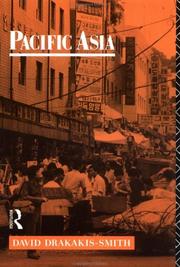
ISBN: 0415069858 978020331302X 020331302X 0203136713 1134913540 1280326824 1134913532 9780203313022 Year: 2002 Publisher: London New York Routledge
Abstract | Keywords | Export | Availability | Bookmark
 Loading...
Loading...Choose an application
- Reference Manager
- EndNote
- RefWorks (Direct export to RefWorks)
Pacific Asia - from Burma to Papua New Guinea to Japan - is the most dynamic and productive region in the developing world, the result of an economic explosion fuelled by industrial activity. This is where the Green Revolution began, where more women are employed in factory work than anywhere alse; the region is also the most predominately socialist in the Third World. David W. Smith assesses Pacific Asia both in terms of its historical development and the present global system, placing general development issues in their local contexts. The book will be an invaluable introduction to the regio
815 Geschiedenis --- 826 Imperialisme, Kolonialisme --- 830 Economie --- 832 Ontwikkelingseconomie --- 835 Natuurlijke rijkdommen --- 836 (Multi-)nationale ondernemingen --- 844.3 Migratie en vluchtelingen --- 848 Demografie --- 883.2 Oost-Azië --- 883.3 Zuidoost-Azië --- 883 Azië --- 885 Oceanië --- Asia --- Pacific Area --- Economic conditions --- Economic policy. --- Economic conditions. --- History.
Book
ISBN: 9783631662199 363166219X 3631706243 3653052327 Year: 2017 Publisher: Peter Lang International Academic Publishing Group
Abstract | Keywords | Export | Availability | Bookmark
 Loading...
Loading...Choose an application
- Reference Manager
- EndNote
- RefWorks (Direct export to RefWorks)
During the Middle Ages, rulers from different regions aspired to an idea of imperial hegemony. On the other hand, there were rulers who deliberately refused to be «emperors», although their reign showed characteristics of imperial rule. The contributions in this volume ask for the reasons why some rulers such as Charlemagne strove for imperial titles, whereas others voluntarily shrank from them. They also look at the characteristics of and rituals connected to imperial rule as well as to the way Medieval empires saw themselves. Thus, the authors in this volume adopt a transcultural perspective, covering Western, Eastern, Northern and Southern Europe, Byzantium and the Middle East. Furthermore, they go beyond the borders of Christianity by including various caliphates and Islamic «hegemonic» rulers like Saladin.
World politics --- Middle Ages. --- Imperialism --- Kings and rulers, Medieval --- Emperors --- Politique mondiale --- Moyen Age --- Impérialisme --- History --- History. --- Histoire --- Impérialisme --- Emperors. --- Herrschaft. --- Imperialism. --- Kings and rulers, Medieval. --- World politics. --- Kaiser, ... --- To 1900. --- Colonialism --- Empires --- Expansion (United States politics) --- Neocolonialism --- Political science --- Anti-imperialist movements --- Caesarism --- Chauvinism and jingoism --- Militarism --- Dark Ages --- History, Medieval --- Medieval history --- Medieval period --- Middle Ages --- World history, Medieval --- World history --- Civilization, Medieval --- Medievalism --- Renaissance --- imperial --- Charlemagne --- Saladin --- Europe --- Byzantium --- Middle East
Book
ISBN: 9050633889 9789050633888 9004401636 Year: 2003 Volume: 3 Publisher: Leiden: Brill,
Abstract | Keywords | Export | Availability | Bookmark
 Loading...
Loading...Choose an application
- Reference Manager
- EndNote
- RefWorks (Direct export to RefWorks)
From the days of the emperor Augustus (27 B.C.-A.D. 14) the emperor and his court had a quintessential position within the Roman Empire. It is therefore clear that when the Impact of the Roman Empire is analysed, the impact of the emperor and those surrounding him is a central issue. The study of the representation and perception of Roman imperial power is a multifaceted area of research, which greatly helps our understanding of Roman society. In its successive parts this volume focuses on 1. The representation and perception of Roman imperial power through particular media: literary texts, inscriptions, coins, monuments, ornaments, and insignia, but also nicknames and death-bed scenes. 2. The representation and perception of Roman imperial power in the city of Rome and the various provinces. 3. The representation of power by individual emperors.
Emperors --- Power (Social sciences) --- Propaganda --- Empereurs --- Pouvoir (Sciences sociales) --- Propagande --- Congresses. --- Art --- Congrès --- Rome --- Provinces --- Administration --- Politics and government --- Politique et gouvernement --- Propaganda, Roman --- Roman provinces --- Iconography --- Conferences - Meetings --- Imperialisme. --- Economische invloeden. --- Culturele invloeden. --- Romeinse rijk. --- Emperors. --- Power (Social sciences). --- Propaganda, Roman. --- Administration. --- Rome (Empire). --- Congrès --- Congresses --- Political science --- Italy --- History --- Propaganda [Roman ] --- Roman propaganda --- Czars (Emperors) --- Rulers --- Sovereigns --- Tsars --- Tzars --- Kings and rulers --- Emperors - Rome - Congresses --- Power (Social sciences) - Rome - Congresses --- Emperors - Rome - Pictorial works - Congresses --- Propaganda, Roman - Congresses --- Rome - Provinces - Administration - Congresses --- Ancient history: to c 500 CE
Book
ISBN: 9781409467328 9781409467342 9781409467335 1409467333 1317118413 1299705200 9781299705203 1317118421 1409467325 9781315587974 9781317118404 9781317118411 9781138332539 1315587971 9781317118428 Year: 2018 Publisher: London Routledge, Taylor & Francis Group
Abstract | Keywords | Export | Availability | Bookmark
 Loading...
Loading...Choose an application
- Reference Manager
- EndNote
- RefWorks (Direct export to RefWorks)
We live in a time of dynamic, but generally regressive regime change-a period in which major political transformations and a rollback of a half-century of legislation are accelerated under conditions of a prolonged and deepening economic crisis and a worldwide offensive against the citizenry and the working class. Written by two of the world's leading left-wing thinkers, Imperialism and Capitalism in the Twenty-First Century takes the form of a number of analytical probes into some of the dynamics of capitalist development and imperialism in contemporary conditions of a system in crisis. It is too early to be definitive about the form that capitalism and imperialism -and socialism-might be or is taking, as we are in but the early stages of a new developmental dynamic, the conditions of which are too complex to anticipate or grasp in thought; they require a closer look and much further study from a critical development and Marxist perspective. The purpose of this book is to advance this process and give some form to this perspective.
Capitalism --- Imperialism --- Globalization. --- Capitalisme --- Impérialisme --- Mondialisation --- Political aspects. --- Economic aspects. --- Aspect politique --- Aspect économique --- -Capitalism --- -Imperialism --- -Globalization --- Global Financial Crisis, 2008-2009 --- 330.122 --- Global Economic Crisis, 2008-2009 --- Subprime Mortgage Crisis, 2008-2009 --- Financial crises --- Global cities --- Globalisation --- Internationalization --- International relations --- Anti-globalization movement --- Colonialism --- Empires --- Expansion (United States politics) --- Neocolonialism --- Political science --- Anti-imperialist movements --- Caesarism --- Chauvinism and jingoism --- Militarism --- Market economy --- Economics --- Profit --- Capital --- Political aspects --- History --- -Economic aspects --- -Latin America --- Asociación Latinoamericana de Libre Comercio countries --- Neotropical region --- Neotropics --- New World tropics --- Spanish America --- Economic conditions --- Globalization --- Economic aspects --- Impérialisme --- Aspect économique --- E-books --- Political philosophy. Social philosophy --- anno 2000-2009 --- anno 2010-2019
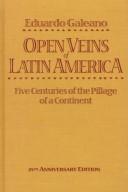
ISBN: 0853459916 0853459908 1583673121 1583673113 Year: 1997 Publisher: New York : Monthly Review Press,
Abstract | Keywords | Export | Availability | Bookmark
 Loading...
Loading...Choose an application
- Reference Manager
- EndNote
- RefWorks (Direct export to RefWorks)
Since its U.S. debut a quarter-century ago, this brilliant text has set a new standard for historical scholarship of Latin America. It is also an outstanding political economy, a social and cultural narrative of the highest quality, and perhaps the finest description of primitive capital accumulation since Marx. Rather than chronology, geography, or political successions, Eduardo Galeano has organized the various facets of Latin American history according to the patterns of five centuries of exploitation. Thus he is concerned with gold and silver, cacao and cotton, rubber and coffee, fruit, hides and wool, petroleum, iron, nickel, manganese, copper, aluminum ore, nitrates, and tin. These are the veins which he traces through the body of the entire continent, up to the Rio Grande and throughout the Caribbean, and all the way to their open ends where they empty into the coffers of wealth in the United States and Europe. Weaving fact and imagery into a rich tapestry, Galeano fuses scientific analysis with the passions of a plundered and suffering people. An immense gathering of materials is framed with a vigorous style that never falters in its command of themes. All readers interested in great historical, economic, political, and social writing will find a singular analytical achievement, and an overwhelming narrative that makes history speak, unforgettably. This classic is now further honored by Isabel Allende's inspiring introduction. Universally recognized as one of the most important writers of our time, Allende once again contributes her talents to literature, to political principles, and to enlightenment.
Latin America --- Amérique latine --- Economic conditions. --- Social conditions --- History --- Conditions économiques --- Conditions sociales --- Histoire --- 812 Ideologie --- 815 Geschiedenis --- 820 Internationale Betrekkingen --- 822.2 Regionale Organisaties --- 822.4 Internationale financiële instellingen --- 826 Imperialisme, Kolonialisme --- 830 Economie --- 831 Internationale Politieke Economie --- 831.1 Handelspolitiek --- 835 Natuurlijke rijkdommen --- 836 (Multi-)nationale ondernemingen --- 837 Financiën en Bankwezen --- 844 Sociale Structuur --- 855.4 Militaire interventies --- 876.2 Inlichtingendienst --- 882.1 Caraïben --- 882.3 Midden-Amerika --- 882.4 Noord-Amerika --- 884 Europa --- 884.2 Noord-Europa --- 884.3 Zuid-Europa --- Latijns-Amerika --- geschiedenis --- sociaal-economische geschiedenis --- geschiedenis. --- sociaal-economische geschiedenis. --- Amérique latine --- Conditions économiques

ISBN: 1554580013 9786613810069 1282166999 1554580986 9781554580989 9781554580019 9781282166998 6613810061 Year: 2007 Publisher: Waterloo, Ont. Wilfrid Laurier University Press
Abstract | Keywords | Export | Availability | Bookmark
 Loading...
Loading...Choose an application
- Reference Manager
- EndNote
- RefWorks (Direct export to RefWorks)
In Desire for Development: Whiteness, Gender, and the Helping Imperative, Barbara Heron draws on poststructuralist notions of subjectivity, critical race and space theory, feminism, colonial and postcolonial studies, and travel writing to trace colonial continuities in the post-development recollections of white Canadian women who have worked in Africa. Following the narrative arc of the development worker story from the decision to go overseas, through the experiences abroad, the return home, and final reflections, the book interweaves theory with the words of the participants to b
Economic development -- Social aspects. --- Imperialism. --- Power (Social sciences). --- Women in development -- Developing countries. --- Women, White -- Developing countries. --- Women, White -- Race identity. --- Women, White --- Women in development --- Power (Social sciences) --- Economic development --- Imperialism --- Economic Theory --- Gender Studies & Sexuality --- Gender & Ethnic Studies --- Business & Economics --- Social Sciences --- Race identity --- Social aspects --- Race identity. --- Social aspects. --- Empowerment (Social sciences) --- Political power --- Colonialism --- Empires --- Expansion (United States politics) --- Neocolonialism --- White women --- Imperialisme. --- Developpement economique --- Pouvoir (Sciences sociales) --- Femmes dans le developpement --- Blanches --- Exchange theory (Sociology) --- Political science --- Social sciences --- Sociology --- Consensus (Social sciences) --- Anti-imperialist movements --- Caesarism --- Chauvinism and jingoism --- Militarism --- Aspect social. --- Identite ethnique. --- Pays en voie de developpement. --- Sociology of minorities --- Developing countries --- Entwicklungsländer.
Book
ISBN: 9681204522 6076288965 Year: 1991 Publisher: México, D.F. Colegio de México
Abstract | Keywords | Export | Availability | Bookmark
 Loading...
Loading...Choose an application
- Reference Manager
- EndNote
- RefWorks (Direct export to RefWorks)
Las buenas relaciones que había entre México y Gran Bretaña se empezaron a deteriorar a partir de la Revolución mexicana. A mediados de los años veinte llegaron a un nuevo acuerdo que duró poco, ya que la nacionalización de la industria petrolera afectó los intereses ingleses. Fue hasta la mitad del siglo cuando se liquidaron las inversiones e intereses tradicionales británicos y se reconciliaron definitivamente el gobierno de Su Majestad británica y el nuevo régimen mexicano posrevolucionario.
History of Asia --- China --- History of Mexico --- History of the United Kingdom and Ireland --- Revoluties. --- Imperialisme. --- International relations. --- BUSINESS & ECONOMICS --- International --- Economics. --- Mexico. --- Great Britain. --- Mexico --- Great Britain --- History --- Relations --- Business economics --- Economics --- Industrial management --- Management --- Microeconomics --- Coexistence --- Foreign affairs --- Foreign policy --- Foreign relations --- Global governance --- Interdependence of nations --- International affairs --- Peaceful coexistence --- World order --- National security --- Sovereignty --- World politics --- Anáhuac --- Estados Unidos Mexicanos --- Maxico --- Méjico --- Mekishiko --- Meḳsiḳe --- Meksiko --- Meksyk --- Messico --- Mexique (Country) --- República Mexicana --- Stany Zjednoczone Meksyku --- United Mexican States --- United States of Mexico --- מקסיקו --- メキシコ --- International economics
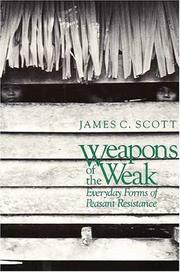
ISBN: 9780300036411 0300033362 0300036418 0585363307 0300153627 9780585363301 9780300153620 9780300033366 Year: 1987 Publisher: New Haven (Conn.) Yale university press
Abstract | Keywords | Export | Availability | Bookmark
 Loading...
Loading...Choose an application
- Reference Manager
- EndNote
- RefWorks (Direct export to RefWorks)
This is a senstive picture of the constant and circumspect struggle waged by peasants materially and ideologically against their oppressors shows that techniques of evasion and resistance may represent the most significant and effective means of class struggle in the run.
844 Sociale structuur --- 826 Imperialisme, kolonialisme --- Activité politique. --- Malaisie --- Conditions rurales. --- Peasants --- Passive resistance --- Social conflict --- Class conflict --- Class struggle --- Conflict, Social --- Social tensions --- Interpersonal conflict --- Social psychology --- Sociology --- Nonviolent noncooperation --- Resistance, Passive --- Satyagraha --- Direct action --- Nonviolence --- Peasantry --- Agricultural laborers --- Rural population --- Marks (Medieval land tenure) --- Villeinage --- Political activity --- Paysannerie --- Résistance passive --- Lutte des classes --- Political activity. --- Malaysia --- Rural conditions. --- Peasants - Political activity - Malaysia --- Passive resistance - Malaysia --- Social conflict - Malaysia --- Agriculture --- Résistance politique --- Révoltes paysannes --- Asie du Sud-Est --- Aspect économique --- Activité politique --- Conditions rurales --- Résistance passive --- Résistance politique --- Révoltes paysannes --- Activité politique. --- Aspect économique --- Activité politique
| Listing 1 - 10 of 17 | << page >> |
Sort by
|

 Search
Search Feedback
Feedback About UniCat
About UniCat  Help
Help News
News